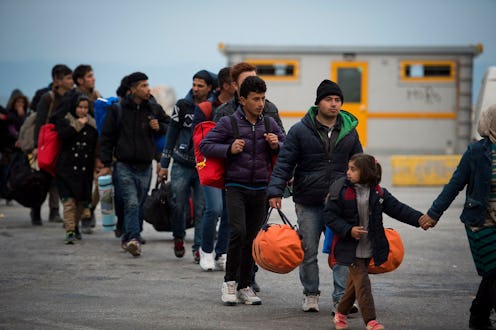News
Keep This In Mind About The Brussels Attacks
On Tuesday, bombings at the Brussels airport, as well as in the bustling Belgian city's metro system, reportedly killed dozens of people and injured more than 100. ISIS has since claimed responsibility for the attacks, and the political fallout of the incident is pretty predictable: a deservedly devastated and forceful response from Belgium, with support from European allies, and a renewed conversation in the United States. This one tweet about Brussels and refugees makes a great point about it all.
It does so at a very opportune time, because you'll probably be hearing more anti-refugee rhetoric very soon. With the United States in the grip of a hotly contested presidential election and Republican frontrunner Donald Trump (in addition to his chief primary rival, Texas Sen. Ted Cruz) already having made some strident and unapologetic statements about America welcoming Syrian refugees, the impact that another high-profile terrorist attack will have on the discourse is clear.
For his part, Trump has already reiterated his call for a ban on any Muslims entering the U.S. ― a temporary ban, he says, although without a clear answer for how long it would be. Cruz has similarly called accepting Syrian refugees "nothing short of lunacy." Needless to say, these reactions seem to forget ― or blatantly ignore ― that when you talk about Syrian refugees, you're talking about some of ISIS' biggest victims.
For the record, beyond the aggressive, unsympathetic tenor of the conversations leading Republican candidates are having about the Syrian refugee population, it's also worth noting that the U.S. is only considering accepting a precious few of them. The Obama administration is seeking to resettle at least 10,000 refugees in the United States, but that figure pales in comparison to the scope of the problem ― according to Amnesty International, there are 4.5 million of them.
In other words, those millions have been driven from Syria by brutal violence, strife, and decay, perpetrated by ISIS militants and forces loyal to the government of Bashar al-Assad. And now, having fled their homeland in hopes of saving themselves, they're getting run through a smear machine whenever ISIS ― their own attacker ― decides to commit another atrocity. It's a positively depressing phenomenon, and hopefully cooler heads ultimately prevail among the voting public. But one thing seems certain: The fear-stoking on this issue isn't going away, and it needs to be pushed against wherever possible.
